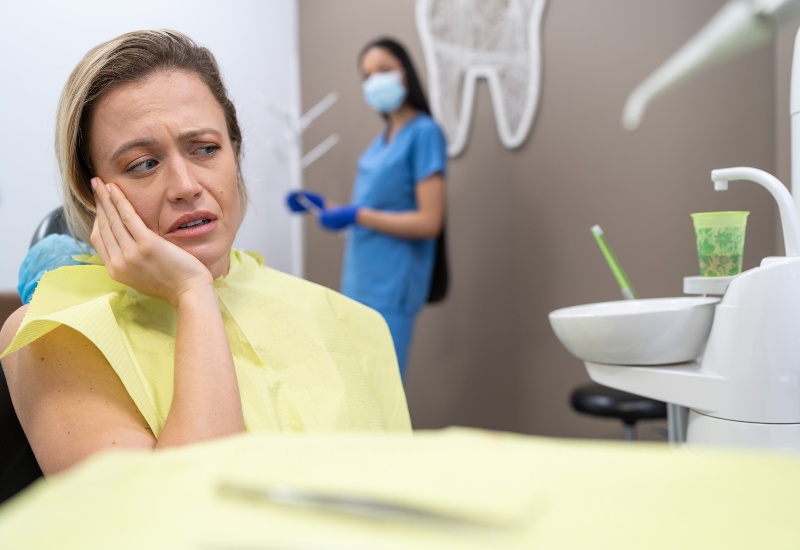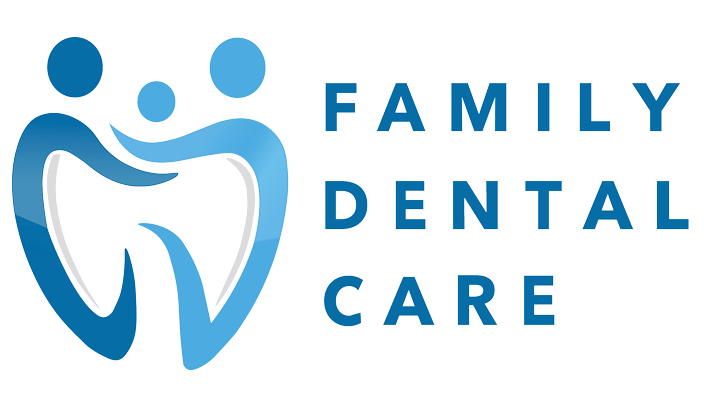Emergency Dentistry
Emergency Dentistry Services in St. Charles and Glen Ellyn, IL
You need immediate, professional care when dental pain strikes unexpectedly or an accident damages your teeth. Family Dental Care offers emergency dentistry services in St. Charles and Glen Ellyn, IL. Our experienced team provides comprehensive emergency dentistry services to patients and provides same-day appointments when you need them most.

What Is a Dental Emergency?
A dental emergency is an oral health problem that requires immediate attention to alleviate severe pain, prevent infection, save a tooth, or address trauma to the mouth. Unlike routine dental problems that can wait for a regular appointment, common dental emergencies demand treatment to prevent complications.
Not every dental issue constitutes an emergency. If you’re experiencing severe pain, uncontrolled bleeding, facial swelling, or trauma to your mouth, you need emergency dental care. When in doubt, it’s always better to call our office.

What to Do in Case of a Dental Emergency?
The first step in any emergency is to remain calm, and take immediate action. Quick thinking and proper first aid can save teeth. Contact our team as soon as possible, and we will provide guidance over the phone while scheduling an emergency appointment. If your emergency occurs outside regular business hours, leave a detailed message describing your situation. If you experience severe facial swelling, difficulty breathing or swallowing, or signs of a serious infection, visit the nearest emergency room immediately.
Emergency Dentistry Services We Provide
Whether you have a knocked-out tooth or a dental abscess, we’re here for you. We offer the following emergency dentistry services:
- Root Canal Therapy: When severe pain indicates infection or damage to the tooth’s pulp, emergency root canal therapy can save your tooth while eliminating pain and infection.
- Emergency Tooth Extractions: If the tooth is severely damaged or poses a risk to surrounding teeth, we perform extractions to prevent further complications.
- Dental Trauma Treatment: Dental trauma treatment includes using advanced restoration techniques to preserve the function and appearance of chipped, cracked, or fractured teeth.
- Abscess and Infection Treatment: Dental abscesses require immediate attention to prevent the spread of infection. We provide treatment to eliminate infection and restore oral health.
- Lost Filling or Crown Replacement: When fillings or crowns become dislodged, we repair or replace them to help prevent further damage.
Different Causes of Dental Emergencies
Most dental emergencies cannot be prevented, so we are always here to help. The most common causes of dental emergencies include:
- Accident-Related Injuries: Sports injuries, falls, automobile accidents, and other trauma can cause knocked-out teeth, fractured teeth, or soft tissue injuries requiring immediate attention.
- Sudden Onset of Severe Pain: Intense toothaches often indicate underlying infections, abscesses, or nerve damage that has progressed to a critical stage.
- Progressive Dental Issues: Minor dental problems, such as untreated cavities, worn dental work, or gum disease that progresses to an abscess, can create dental emergencies.
- Accidental Damage to Dental Work: Existing fillings, crowns, or other dental restorations can become damaged or dislodged, exposing sensitive tooth structures and causing significant discomfort.
How to Handle Common Dental Emergencies
We’re always here to address dental emergencies. Below, we explain how to handle the most common dental emergencies.
Knocked-Out Tooth
Try to avoid touching the root of the tooth, and only handle it by the crown. If dirty, rinse gently with water, but don’t scrub. Do your best to place the tooth back into its socket, but keep it moist in milk or saliva if reinsertion isn’t possible. Seek treatment within 30 minutes for the best chance of saving the tooth.
Severe Toothache
Rinse your mouth with warm salt water. Floss around the affected tooth to remove any trapped debris. Apply a cold compress to the outside of your cheek.
Chipped or Broken Tooth
If possible, save any broken pieces, and rinse your mouth and the tooth fragments with warm water. Use a cold compress to minimize swelling. Temporarily, cover sharp edges with dental wax or sugar-free gum.
Lost Filling or Crown
Locate the restoration if possible. Clean the affected area gently, and use temporary dental cement or sugar-free gum to protect the exposed tooth. Avoid chewing on the affected side.
Dental Abscess
Rinse with salt water several times daily. Apply a cold compress to reduce swelling. Take over-the-counter pain medication as directed. Seek immediate treatment, as abscesses can be life-threatening if left untreated.

Signs That Indicate You Need an Emergency Dentist
Recognizing the signs of dental emergencies can help you seek appropriate care promptly. The most common signs of dental emergencies include:
- Severe, Persistent Pain: Intense tooth pain that doesn’t respond to over-the-counter pain medication or interferes with sleep and daily activities requires immediate attention.
- Significant Swelling: Facial swelling, especially when accompanied by fever, difficulty swallowing, or breathing problems, indicates a severe infection.
- Uncontrolled Bleeding: Bleeding from the mouth that doesn’t stop within 10-15 minutes of applying pressure requires professional care.
- Loose or Displaced Teeth: If trauma has loosened or partially displaced a tooth, immediate treatment may save it.
- Metallic Taste and Fever: These symptoms, especially when combined with facial swelling, may indicate a serious infection requiring immediate antibiotic treatment.
- Pus or Discharge: Any discharge from the gums or around teeth suggests infection that needs professional treatment.
Tips to Prevent Dental Emergencies
Not all dental emergencies can be prevented. Follow these guidelines to reduce your risk significantly:
- Maintain Excellent Oral Hygiene: Brush twice a day with fluoride toothpaste, floss daily, and use an antimicrobial mouthwash.
- Attend Regular Dental Checkups: Regular examinations and cleanings help identify and address potential problems before they become emergencies.
- Wear Protective Gear: Use mouthguards during sports activities and a nightguard if you grind your teeth.
- Avoid Harmful Habits: Don’t chew ice, hard candies, or non-food items, avoid using teeth as tools to open packages, and don’t bite fingernails or pen caps.
- Address Dental Issues Promptly: Don’t ignore minor dental problems, as they often worsen without treatment and can develop into emergencies.
Other Dental Services We Offer
Beyond general, cosmetic, and pediatric emergency dentistry services, Family Dental Care provides all types of dental care, from teeth whitening to periodontal disease treatment. Our other dental services include:
Why Choose Family Dental Care?
Family Dental Care has extensive experience handling all types of dental emergencies with skill and compassion. We reserve time in our schedule specifically for emergency patients, ensuring you receive prompt care when you need it most. Our modern equipment allows for accurate diagnosis and effective treatment, often resolving issues in a single visit. With offices serving St. Charles, Glen Ellyn, and the surrounding areas, quality 24-hour emergency dentistry is always within reach. Reach out to us today to schedule an appointment.
Dental Emergency Frequently Asked Questions
Can I prevent dental emergencies?
No one can completely prevent dental emergencies. It’s vital to maintain positive oral health, attend regular dental checkups, and wear a mouthguard during physical activity.
Can a tooth infection spread to other parts of the body?
Yes, untreated tooth infections can spread beyond the mouth to other parts of the body, including the jaw, neck, and even the bloodstream, leading to serious health complications. This is why prompt treatment of dental infections is crucial for oral and overall health.
What foods should I avoid after emergency dental treatment?
After emergency dental treatment, stick to soft foods and avoid anything hard, crunchy, sticky, or extremely hot or cold. Avoid nuts, chips, candy, ice cream, and hot beverages until we give you clearance to resume your regular diet.
What if I have an allergic reaction to a dental treatment?
If you experience symptoms of an allergic reaction such as swelling, difficulty breathing, hives, or severe itching after dental treatment, seek immediate medical attention.
